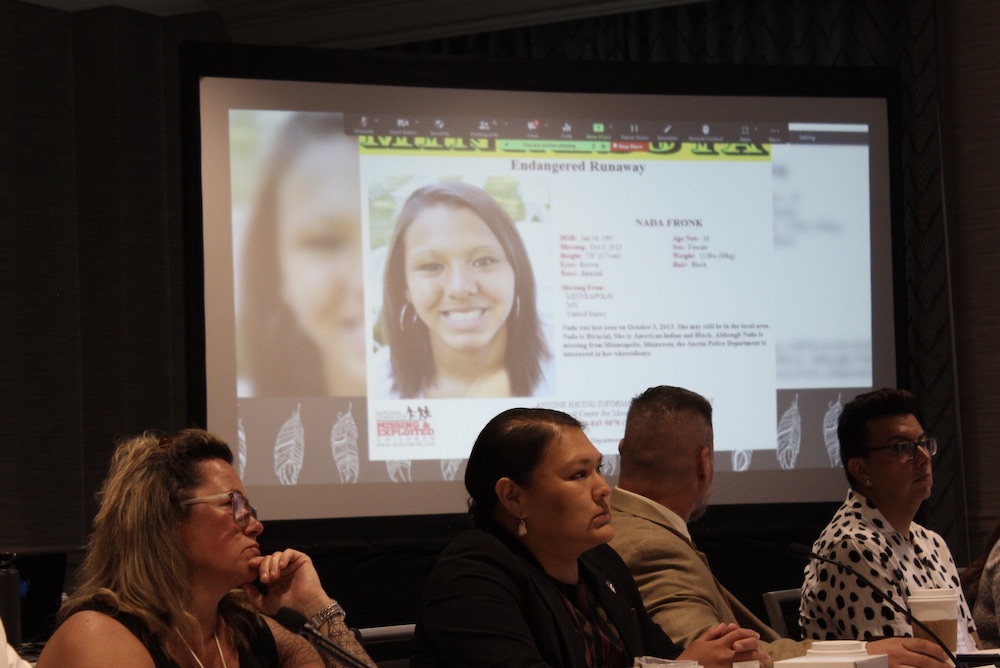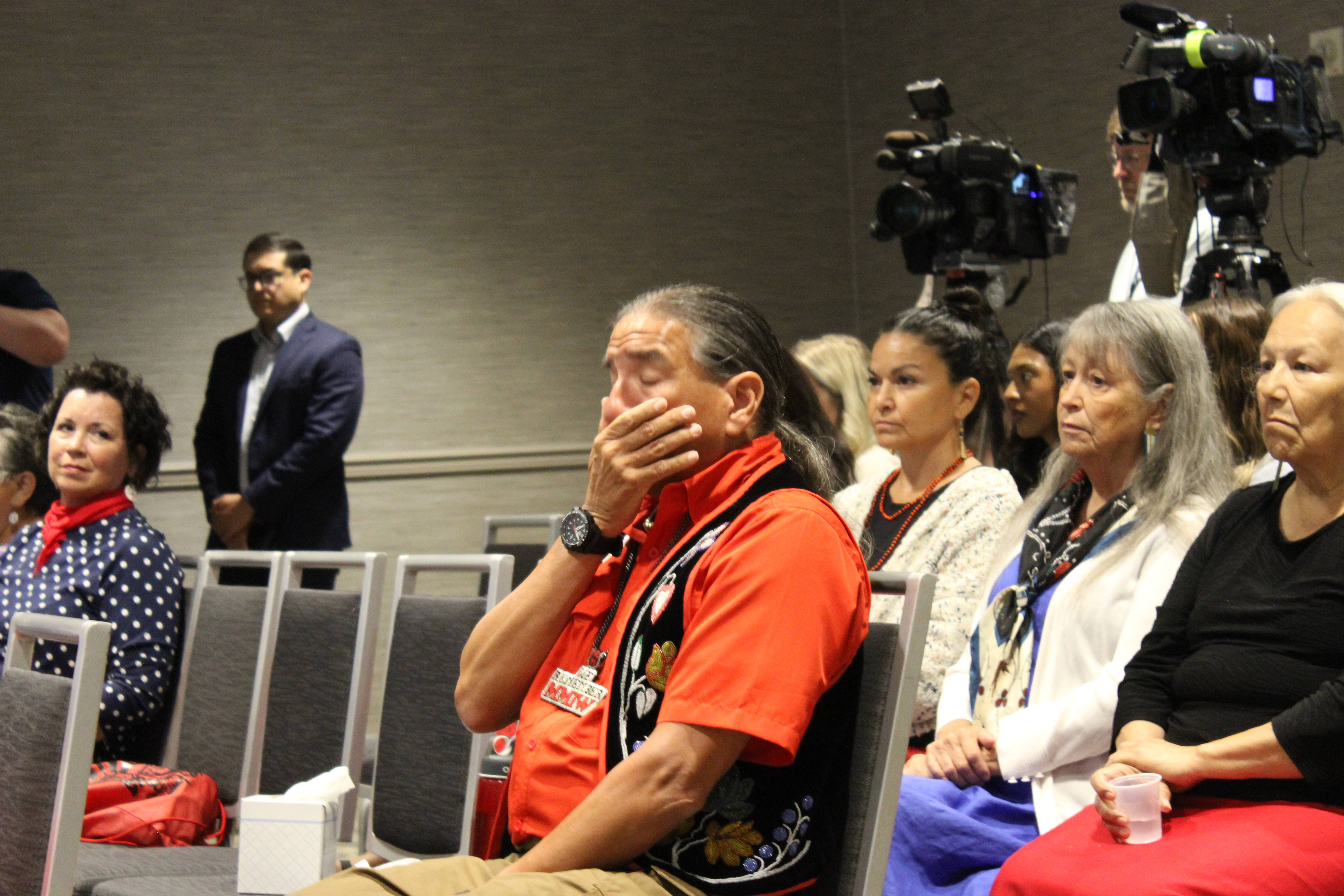
- Details
- By Levi Rickert
Opinion. Monte Fronk was on duty in his official capacity as a representative of the Mille Lacs Tribal Police at the Road to Healing tour stop at the Mille Lacs Indian Community in central Minnesota a week ago Saturday.
Fronk could have simply mixed in with other law enforcement officers, who were there to provide security for Interior Secretary Deb Haaland (Laguna Pueblo) and Assistant Secretary Indian Affairs Bryan Newland (Bay Mills Indian Community).
But he didn’t.
Prior to the arrival of the Department of the Interior officials, he approached me to tell me how much he enjoys Native News Online. We talked for a few minutes. Then the conversation turned to another subject. He told me that he would be at the Not Invisible Act Commission field hearing in Minneapolis the following Tuesday to share a personal testimony. I told him I would be there as well and would look for him. Then we went back to the business at hand, the Road to Healing tour.
At the Not Invisible Act hearing on Tuesday in Minneapolis, Fronk, who is a tribal citizen of the Red Lake Nation, shared his compelling and, at times, tearful testimony. May 26, 2021, he testified, was the worst day of his life. It was the day he was informed his daughter, Nada, 24, had been murdered.

He recounted her horrific journey as a runaway who was trafficked and eventually murdered by her boyfriend. After Nada was killed, her killer took his own life.
Fronk’s testimony was accompanied by photo slides of his pretty daughter as well as a graphic photo of the crime scene.
“This is what murder looks like,” he said.
“It isn't a banner. It isn’t a red hand. This is what it looks like,” Fronk said through tears.
As he gathered himself, Fronk said MMIP advocates had asked him to not let his daughter’s death become a checked box. His voice needed to be heard.
“In this epidemic, who do we hear from? Who are the voices of this epidemic? They are the mother, the grandmothers, the sisters, the aunties, and the cousins,” he said. “Who we don’t hear from are the fathers. So, I stand before you as a fellow brother in public safety as a father of a murdered and missing Indigenous woman, who was my daughter.”
Fronk’s testimony before the Commission was made at the fourth stop of a four-month tour across Indian Country to hear testimony from family and friends of victims of the missing, murdered and trafficked Native Americans.
The Commission was established to implement the Not Invisible Act that was passed by Congress and signed into law. The original legislation was introduced by Interior Secretary Deb Haaland (Laguna Pueblo) when she was still a member of Congress.
On Tuesday, Secretary Haaland addressed the hearing via a live video. “This commission will give hope to the families that have lost their loved ones from violence,” she said from her office at the Interior Department in Washington.
“I know that this epidemic of violence against our people is a heavy burden that we all carry. That’s why we’re working quickly to get more resources on the ground by throwing the full weight of the federal government at this crisis, and through actions that include the Missing and Murdered unit with the Bureau of Indian Affairs,” Haaland said.
Haaland said to date there have been 741 cases investigated and 266 cases either solved or closed.
Minnesota Lt. Governor Peggy Flanagan (White Earth Ojibwe) also addressed the Commission
“Only since we began to listen to those who've been silenced — those silent voices — have we begun to see the path forward and develop strategies for ending this crisis,” Flanagan said.
Also testifying during the time allotted for the media to listen was Melissa Pamp (Little Traverse Bay Bands of Odawa Indians), whose daughter Nagohns-ba Massey was murdered on the Isabella Indian Reservation, home of the Saginaw Chippewa Tribe, testified. She testified her daughter was only 21 years old when she was stabbed.
She recounted the difficulties and ongoing court delays she and her family endured before seeing that justice was served to the murderer of Nagohns-ba.
“I encourage you to get involved with these cases that are going on in your tribal nations. I don't think that back then, our ancestors would have just sat around and stood silent if our women and our children kept on going missing or were murdered,” Pamp said.
Melissa Pamp is right. We need to join her and Secretary Haaland and Peggy Flanagan and Monte Fronk in making sure that Native voices are heard as this crisis continues to take our sisters and brothers away from us. As Native people, we cannot be silent.
Thayék gde nwéndëmen - We are all related.
The Not Invisible Act Commission will hold its next field hearing on Tuesday, June 13 and Wednesday, June 14 at the Blue Lake Casino in Blue Lake, California.
More Stories Like This
The SAVE America Act Threatens Native Voting Rights — We Must Fight BackThe Presidential Election of 1789
Cherokee Nation: Telling the Full Story During Black History Month
Jesse Jackson Changed Politics for the Better
Native News Online at 15: Humble Beginnings, Unwavering Mission
Help us defend tribal sovereignty.
At Native News Online, our mission is rooted in telling the stories that strengthen sovereignty and uplift Indigenous voices — not just at year’s end, but every single day.
Because of your generosity last year, we were able to keep our reporters on the ground in tribal communities, at national gatherings and in the halls of Congress — covering the issues that matter most to Indian Country: sovereignty, culture, education, health and economic opportunity.
That support sustained us through a tough year in 2025. Now, as we look to the year ahead, we need your help right now to ensure warrior journalism remains strong — reporting that defends tribal sovereignty, amplifies Native truth, and holds power accountable.
 The stakes couldn't be higher. Your support keeps Native voices heard, Native stories told and Native sovereignty defended.
The stakes couldn't be higher. Your support keeps Native voices heard, Native stories told and Native sovereignty defended.
Stand with Warrior Journalism today.
Levi Rickert (Potawatomi), Editor & Publisher

